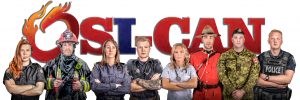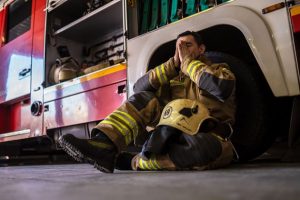Former Correctional Officer Pattie Atwell enjoyed a fulfilling 10-year career at a Women’s Correctional Centre in Headingly, MB, but an occupational stress injury in 2017 sent her into a slow spiral with unexpected consequences she couldn’t have foreseen until it was too late.
“I didn’t have any idea that I was getting sick,” says Atwell. “Hindsight is 20/20, I can definitely see it now looking back. But even my husband, who is a police officer, didn’t see the signs either. So, when everything went off the rails, neither of us had any idea what was going on.”
A routine visit to the doctor’s office resulted in a diagnosis of Post-Traumatic Stress Disorder (PTSD) that abruptly ended Atwell’s career as a CO. She says she had no idea at the time that her last day at work would be her last day at work. “It was a gradual accumulation of stress that just came to a head. You never know what your max is until you reach it,” she adds.
That was when Atwell discovered OSI-CAN, a non-profit joint initiative between the Canadian Mental Health Association (CMHA) and the Canadian Legion Saskatchewan Command specifically designed to address the unique mental health challenges faced by First Responders and Military. They offer peer-to-peer support groups and other resources for both active and retired First Responder and military personnel with occupational stress injuries, psychological trauma and PTSD.
Atwell began working with OSI-CAN in 2020, pivoting her career to focus on helping other First Responders who struggle with their mental health. Today she is a Provincial Coordinator for OSI-CAN Manitoba, building peer support resources for First Responders and their families.
“One of the foundations of OSI-CAN being peer-to-peer is that the group facilitators are also First Responders,” Atwell explains. “Often these are people who have their own operational stress injuries. So, they’ve also had to do their own work in recovering from many of the same traumas the participants are in various stages of recovering from.”
“I won’t even lie,” she adds, “I’ve taken advantage of the peer support groups myself.”
 OSI-CAN was founded in Saskatchewan in 2016. Since then, they have added in-person groups in Alberta and BC, with virtual groups available in most provinces. The initiative grows exclusively through donations and grants. Atwell says OSI-CAN is unique because their services are completely barrier free; no official diagnosis or medical referral is required for First Responders to attend the group, and there are no fees to attend.
OSI-CAN was founded in Saskatchewan in 2016. Since then, they have added in-person groups in Alberta and BC, with virtual groups available in most provinces. The initiative grows exclusively through donations and grants. Atwell says OSI-CAN is unique because their services are completely barrier free; no official diagnosis or medical referral is required for First Responders to attend the group, and there are no fees to attend.
Through their peer support resources, OSI-CAN deals with anything from anxiety and depression to agoraphobia, as well as the more serious symptoms associated with PTSD. But Atwell says it’s important to remember that peer support initiatives are not meant to take the place of other recovery tools like therapy and medication. In fact, OSI-CAN even provides its clients with a shortlist of trusted mental health professionals in the area who their staff have personally seen. The CMHA also offers its own set of resources to OSI-CAN participants, which Atwell says has been a major asset.
“We don’t come off as clinicians, because we’re not clinicians,” Atwell says. “We actually work with psychologists and psychiatrists in conjunction with peer support. Instead of leaving them to open the proverbial ‘yellow pages,’ we direct participants to qualified individuals who have already worked with first responders and specialize in that area.”
OSI-CAN offers a myriad of other mental health resources to First Responders aside from peer groups, including access to assistance for obtaining service animals, as well as resources to help offset the costs. They also work with a ‘Healing with Horses’ organization in Saskatchewan to offer equine support therapy, and they’re in the process of developing relationships with equine support networks in Manitoba as well. OSI-CAN is also developing and producing their own written resources, including educational books for adults and children about PTSD and mental health.
Atwell adds that many resources provided to the general public are not practical for First Responders to appropriately take advantage of.
“Consider a police officer or a paramedic sitting in a general public peer support group,” she says. “With the trauma that happens to the majority of people, when it involves a criminal or medical emergency, sometimes the First Responders that respond to the call in that community will be sitting in the group. But they can’t just say ‘oh, I was there,’ it would be inappropriate. But then it also shuts them down from sharing their own experiences. They’re not truly among peers. When you’re talking about how trauma occurs on the job, that’s where they need the support of their own peer group.”
 OSI-CAN fills that gap, providing a space where individuals who incur trauma in the service can confide in and support one another. This peer-to-peer philosophy is a major pillar of OSI-CAN’s operations, and it comes from the very top. Julius Brown, the National Director of OSI-CAN, is a former military member with his own operational stress injury.
OSI-CAN fills that gap, providing a space where individuals who incur trauma in the service can confide in and support one another. This peer-to-peer philosophy is a major pillar of OSI-CAN’s operations, and it comes from the very top. Julius Brown, the National Director of OSI-CAN, is a former military member with his own operational stress injury.
OSI-CAN also offers peer support groups for the families of First Responders. “The nature of our work can really take a toll on our families at home,” Atwell points out. “What I know to be true in our First Responder community is that divorce rates are very high. And suicide rates, as well, in comparison to the general population.”
She goes on to say that family members and friends, often inadvertently, end up in a caregiving role for First Responders who are struggling with their mental health. This can be quite taxing on that relationship over time. Because of the stigma surrounding mental health in the First Response community, often times a First Responder will hold off on getting the professional help they need. Atwell acknowledges that this puts a lot of pressure on family and friends.
The goal of OSI-CAN’s peer support groups for families is not so much about helping them understand what their First Responder loved one is going through, although OSI-CAN does offer that service if needed. Rather, the aim is to nurture self-care habits and coping strategies. Atwell says having a stable family situation at home can be a strain on a First Responder’s recovery from occupational stress injuries and psychological trauma.
“There can be a lot of anger, isolation, depression, suicidal thoughts, anxiety, agoraphobia… that sort of thing,” Atwell says. “And sometimes the people that are taking care of us need their own support. These groups are meant to support those that support us.”
To find out if OSI-CAN offers free peer support resources in your area, visit www.osi-can.ca. If there are no services offered in your area, you can request one.
“When I went through my own operational stress injury, there wasn’t an organization like OSI-CAN in my area,” Atwell recalls. “I didn’t know where to reach out for help. But as I’ve progressed through my own recovery, I’ve noted the resources that have helped me along the way, and that has helped me to be able to provide better resources to our participants at OSI-CAN. Everything just compliments and supports each other really well.”


